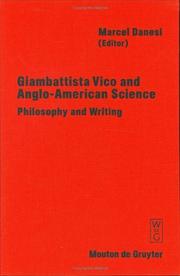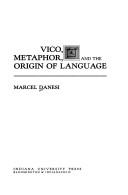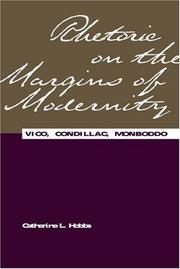| Listing 1 - 10 of 11 | << page >> |
Sort by
|
Book
ISBN: 3736416911 0649753534 Year: 2016 Publisher: [Dinslaken] : [Anboco],
Abstract | Keywords | Export | Availability | Bookmark
 Loading...
Loading...Choose an application
- Reference Manager
- EndNote
- RefWorks (Direct export to RefWorks)
Vico, Giambattista, --- Vico, G. --- Vico, G. B. --- Vico, Giovanni Battista, --- Vico, Juan Bautista, --- Pikʻo, --- Vico, Giovan Battista, --- ויקו, ג׳מבטיסטה, --- Weike, --- 维柯,
Book
ISBN: 9780511749834 051174983X 0511847289 1107203953 1282630628 9786612630620 0511749082 0511743289 0511742215 0511750579 0511744366 0521190622 1107646723 Year: 2010 Publisher: Cambridge ; New York : Cambridge University Press,
Abstract | Keywords | Export | Availability | Bookmark
 Loading...
Loading...Choose an application
- Reference Manager
- EndNote
- RefWorks (Direct export to RefWorks)
Considered the most original thinker in the Italian philosophical tradition, Giambattista Vico has been the object of much scholarly attention but little consensus. In this new interpretation, David L. Marshall examines the entirety of Vico's oeuvre and situates him in the political context of early modern Naples. Marshall presents Vico's work as an effort to resolve a contradiction. As a professor of rhetoric at the University of Naples, Vico had a deep investment in the explanatory power of classical rhetorical thought, especially that of Aristotle, Cicero, and Quintilian. Yet as a historian of the failure of Naples as a self-determining political community, he had no illusions about the possibility or worth of democratic and republican systems of government in the post-classical world. As Marshall demonstrates, by jettisoning the assumption that rhetoric only illuminates direct, face-to-face interactions between orator and auditor, Vico reinvented rhetoric for a modern world in which the Greek polis and the Roman res publica are no longer paradigmatic for political thought.
Rhetoric --- Philosophy. --- Vico, Giambattista, --- Vico, G. --- Vico, G. B. --- Vico, Giovanni Battista, --- Vico, Juan Bautista, --- Pikʻo, --- Vico, Giovan Battista, --- ויקו, ג׳מבטיסטה, --- Weike, --- 维柯, --- Arts and Humanities --- History

ISBN: 3110136651 3110881349 9783110881349 9783110136654 Year: 1995 Publisher: Berlin ; New York : Mouton de Gruyter,
Abstract | Keywords | Export | Availability | Bookmark
 Loading...
Loading...Choose an application
- Reference Manager
- EndNote
- RefWorks (Direct export to RefWorks)
Vico, Giambattista --- Vico, Giambattista, - 1668-1744. --- Philosophy. --- Mental philosophy --- Humanities --- Vico, Giambattista, --- Vico, G. --- Vico, G. B. --- Vico, Giovanni Battista, --- Vico, Juan Bautista, --- Pikʻo, --- Vico, Giovan Battista, --- ויקו, ג׳מבטיסטה, --- Weike, --- 维柯,

ISBN: 0253113709 058520294X 9780585202945 9780253113702 0253316073 9780253316073 Year: 1993 Publisher: Bloomington : Indiana University Press,
Abstract | Keywords | Export | Availability | Bookmark
 Loading...
Loading...Choose an application
- Reference Manager
- EndNote
- RefWorks (Direct export to RefWorks)
The origin of language is one of the deep mysteries of human existence. Drawing upon the work of the eighteenth-century Italian philosopher Giambattista Vico, Marcel Danesi fashions a persuasive, original account of the evolution and development of language. Seeking to reconstruct the primitive mind that generated language and the evolutionary events that must have preceded the advent of speech, he takes Vico's insight that mind, culture, and language evolved from the uniquely human faculty known as fantasia ("the imagination") and sketches a "primal scene" of compelling interest. Danesi identifies metaphor, the feature of mind that transforms iconic, perceptual thinking into conceptual thinking, as the crucial event in the Vichian scenario. The description of this scenario forms the core of Vico, Metaphor, and the Origin of Language. Danesi then evaluates the Vichian reconstruction of the origin of language in light of contemporary research in the cognitive, social, and biological sciences and with competing theories.
Metaphor. --- Language and languages --- Parabole --- Figures of speech --- Reification --- Origin of languages --- Speech --- Origin. --- Origin --- Vico, Giambattista, --- Vico, G. --- Vico, G. B. --- Vico, Giovanni Battista, --- Vico, Juan Bautista, --- Pikʻo, --- Vico, Giovan Battista, --- ויקו, ג׳מבטיסטה, --- Weike, --- 维柯,
Book
ISBN: 0585091617 9780585091617 1438422873 Year: 1987 Publisher: Albany : State University of New York Press,
Abstract | Keywords | Export | Availability | Bookmark
 Loading...
Loading...Choose an application
- Reference Manager
- EndNote
- RefWorks (Direct export to RefWorks)
Literature and history --- Cycles --- Cyclic theory --- Natural cycles --- Periodicity --- Philosophy --- Rhythm --- Joyce, James, --- Vico, Giambattista, --- Vico, G. --- Vico, G. B. --- Vico, Giovanni Battista, --- Vico, Juan Bautista, --- Pikʻo, --- Vico, Giovan Battista, --- ויקו, ג׳מבטיסטה, --- Weike, --- 维柯, --- Sources --- Influence
Book
ISBN: 9781139198882 9781107025875 9781107670839 9781139549998 1139549995 1139198882 1107025877 1139889273 1139564781 1139552503 1139554956 1139556207 128363838X 1139551248 1107670837 Year: 2012 Publisher: Cambridge ; New York : Cambridge University Press,
Abstract | Keywords | Export | Availability | Bookmark
 Loading...
Loading...Choose an application
- Reference Manager
- EndNote
- RefWorks (Direct export to RefWorks)
In this highly original study Joseph Mali explores how four attentive and inventive readers of Giambattista Vico's New Science (1744) - the French historian Jules Michelet (1798-1874), the Irish writer James Joyce (1882-1941), the German literary scholar Erich Auerbach (1892-1957) and the English philosopher Isaiah Berlin (1909-1997) - came to find in Vico's work the inspiration for their own modern theories (or, in the case of Joyce, stories) of human life and history. Mali's reconstruction of the specific biographical and historical occasions in which these influential men of letters encountered Vico reveals how their initial impressions and interpretations of his theory of history were decisive both for their intellectual development and their major achievements in literature and thought. This new interpretation of the legacy of Vico's New Science is essential reading for all those engaged in the history of ideas and modern cultural history.
Civilization --- Cultural history --- History. --- Vico, Giambattista, --- Vico, G. --- Vico, G. B. --- Vico, Giovanni Battista, --- Vico, Juan Bautista, --- Pikʻo, --- Vico, Giovan Battista, --- ויקו, ג׳מבטיסטה, --- Weike, --- 维柯, --- Influence. --- Arts and Humanities --- History
Book
ISBN: 8864530665 8864530681 9788864530680 Year: 2009 Volume: 86 Publisher: Firenze University Press
Abstract | Keywords | Export | Availability | Bookmark
 Loading...
Loading...Choose an application
- Reference Manager
- EndNote
- RefWorks (Direct export to RefWorks)
This book is a retrospective view of modern philosophical anthropology through the works of two of its greatest exponents. the author demonstrates how mythology, the philosophy of history and language and Vico's concept of man had as a constant referral point Malebranche's psychology with its Cartesian formulation. The idolatrous and mythopoietic imagination that is described in La Scienza Nuova (New Science) has much in common with the "pagan" mind (that is to say the mind subjugated to passions, sensitivity and fantasy that is described in La Recherche (The Search after Truth). Some of the themes discussed here are myth, the metaphoric nature of thought, idolatry, the formation of mentality, the relationships which bind passions and representations and the association of ideas through iconic images. Also discussed are other themes such as the structure of society and imagination, imitation, persuasion and social relationships, communication within society between illustrious imaginations. Moreover in Malebranche has been found a complex and complete theory of imaginative universals (universali fantastici).
Imagination (Philosophy) --- Vico, Giambattista, --- Malebranche, Nicolas, --- Philosophy --- Vico, G. --- Vico, G. B. --- Vico, Giovanni Battista, --- Vico, Juan Bautista, --- Pikʻo, --- Vico, Giovan Battista, --- ויקו, ג׳מבטיסטה, --- Weike, --- 维柯, --- Malebranche, Nicolas --- Malebranche, Nicolas de, --- Open Access --- Filosofia --- storia della filosofia --- Giambattista Vico --- Filosofia del linguaggio --- Nicolas Malebranche
Book
ISBN: 9004416331 900430911X Year: 2020 Publisher: Leiden, The Netherlands : Brill,
Abstract | Keywords | Export | Availability | Bookmark
 Loading...
Loading...Choose an application
- Reference Manager
- EndNote
- RefWorks (Direct export to RefWorks)
Georges Sorel’s Study on Vico is a revelatory document of the depths and stakes of French social thought at the end of the 19th century. What brought Sorel to the 18th century Neapolitan theorist of history? Acute awareness of the limitations of Marxist thought in his day, a profound concern with the material underpinnings of language, law, and culture, and the imperative to understand the possibilities of revolutionary change. We find here a different Sorel, one who speaks in surprising ways to the 21st century. The translation is accompanied by an introduction and by a set of notes which situate the text both in Sorel’s overall intellectual trajectory and in the fin de siècle debates from which it emerged.
Philosophy, Marxist. --- Philosophy, Italian. --- Social sciences --- Philosophy. --- Vico, Giambattista, --- Sorel, Georges, --- Social philosophy --- Social theory --- Italian philosophy --- Marxian philosophy --- Marxist philosophy --- Communism and philosophy --- Sorel, George, --- Sorel, Jorge, --- Sorelʹ, Zhorzh, --- Сорель, Жорж, --- Vico, G. --- Vico, G. B. --- Vico, Giovanni Battista, --- Vico, Juan Bautista, --- Pikʻo, --- Vico, Giovan Battista, --- ויקו, ג׳מבטיסטה, --- Weike, --- 维柯, --- History of ideas
Book
ISBN: 0801461359 0801460875 9780801460876 9780801449161 0801449162 9780801461354 Year: 2011 Publisher: Ithaca : Cornell University Press,
Abstract | Keywords | Export | Availability | Bookmark
 Loading...
Loading...Choose an application
- Reference Manager
- EndNote
- RefWorks (Direct export to RefWorks)
Vico and Naples is an intellectual portrait of the Neapolitan philosopher Giambattista Vico (1668-1744) that reveals the politics and motivations of one of Europe's first scientists of society. According to the commonplaces of the literature on the Neapolitan, Vico was a solitary figure who, at a remove from the political life of his larger community, steeped himself in the recondite debates of classical scholarship to produce his magnum opus, the New Science. Barbara Ann Naddeo shows, however, that at the outset of his career Vico was deeply engaged in the often-tumultuous life of his great city and that his experiences of civic crises shaped his inquiry into the origins and development of human society.With its attention to Vico's historical, rhetorical, and jurisprudential texts, this book recovers a Vico who was keenly attuned to the social changes transforming the political culture of his native city. He understood the crisis of the city's corporate social order and described the new social groupings that would shape its future. In Naddeo's pages, Vico comes alive as a prescient judge of his city and the political conundrum of Europe's burgeoning metropolises. He was dedicated to the acknowledgment and juridical remedy of Naples' vexing social divisions and ills. Naddeo also presents biographical vignettes illuminating Vico's role as a Professor of Rhetoric at the University of Naples and his bid for the prestigious Morning Chair of Civil Law, which foundered on the directives of the Habsburgs and the politics of his native city. Rich with period detail, this book is a compelling and vivid reconstruction of Vico's life and times and of the origins of his powerful notion of the social.
Cities and towns --- Social sciences --- Global cities --- Municipalities --- Towns --- Urban areas --- Urban systems --- Human settlements --- Sociology, Urban --- Behavioral sciences --- Human sciences --- Sciences, Social --- Social science --- Social studies --- Civilization --- Philosophy --- History. --- Vico, Giambattista, --- Rome --- Naples (Kingdom) --- Regno di Napoli --- Napoli (Kingdom) --- Sicily (Italy) --- Kingdom of the Two Sicilies --- Historiography. --- Vico, G. --- Vico, G. B. --- Vico, Giovanni Battista, --- Vico, Juan Bautista, --- Pikʻo, --- Vico, Giovan Battista, --- ויקו, ג׳מבטיסטה, --- Weike, --- 维柯,

ISBN: 0585485739 9780585485737 0809324695 9780809324699 Year: 2002 Publisher: Carbondale : Southern Illinois University Press,
Abstract | Keywords | Export | Availability | Bookmark
 Loading...
Loading...Choose an application
- Reference Manager
- EndNote
- RefWorks (Direct export to RefWorks)
Rhetoric --- Philology & Linguistics --- Languages & Literatures --- Language and languages --- Speaking --- Authorship --- Expression --- Literary style --- History --- Vico, Giambattista, --- Condillac, Etienne Bonnot de, --- Monboddo, James Burnett, --- Burnet, James, --- Monboddo, --- Bonnot de Condillac, Etienne, --- Kondilʹi︠a︡k, E., --- De Condillac, Etienne Bonnot, --- Bonnot, Etienne, --- Condillac, Etienne de, --- Kondilʹi︠a︡k, Ėtʹenn Bonno de, --- Condillac, --- Kondilliak, --- Vico, G. --- Vico, G. B. --- Vico, Giovanni Battista, --- Vico, Juan Bautista, --- Pikʻo, --- Vico, Giovan Battista, --- ויקו, ג׳מבטיסטה, --- Weike, --- 维柯, --- Contributions in rhetoric. --- Кондильяк, Е., --- Кондильяк, Этьенн Бонно де,
| Listing 1 - 10 of 11 | << page >> |
Sort by
|

 Search
Search Feedback
Feedback About UniCat
About UniCat  Help
Help News
News